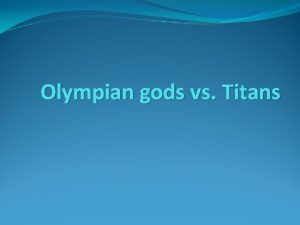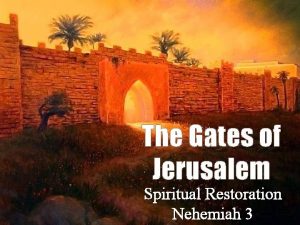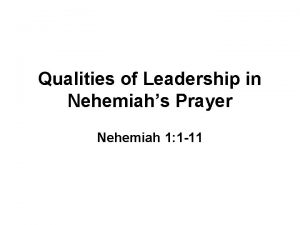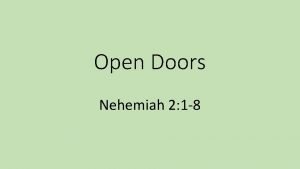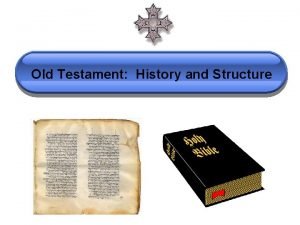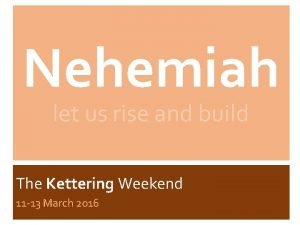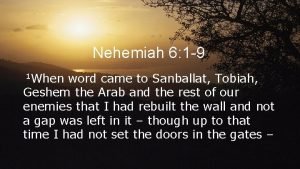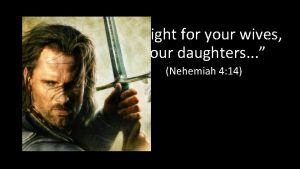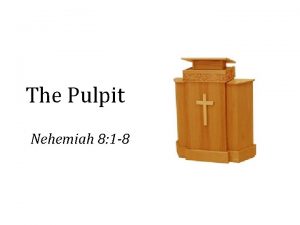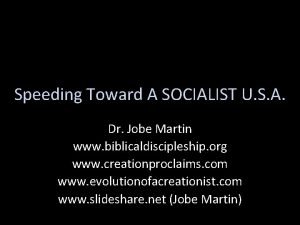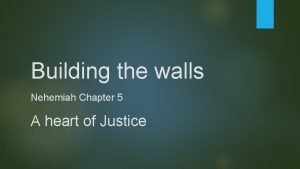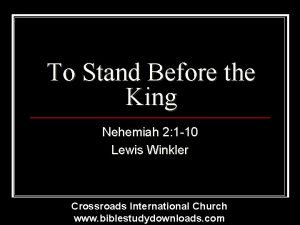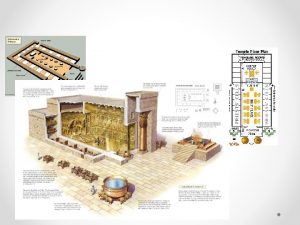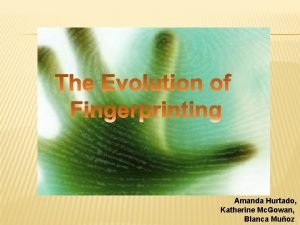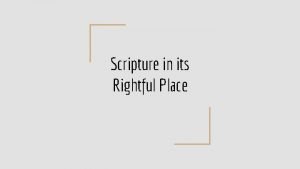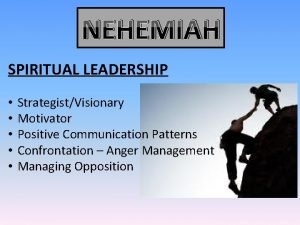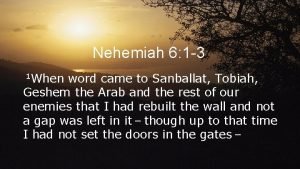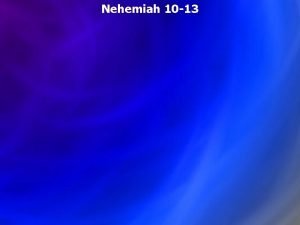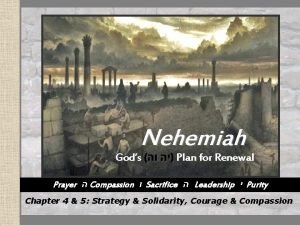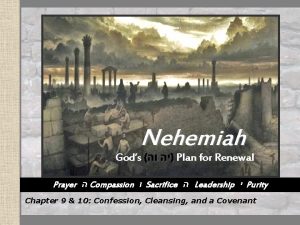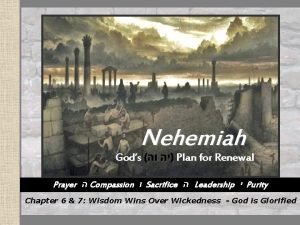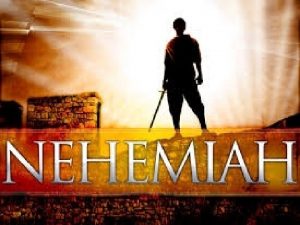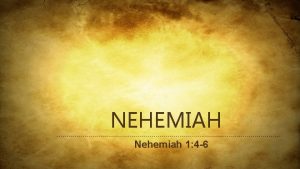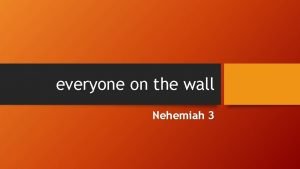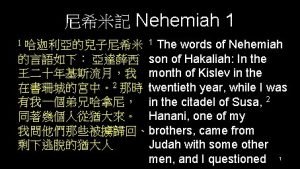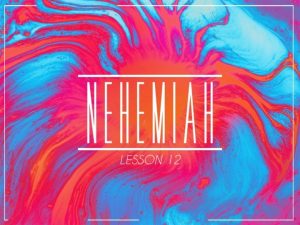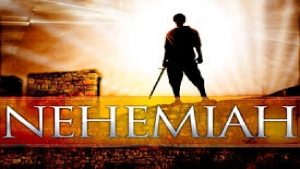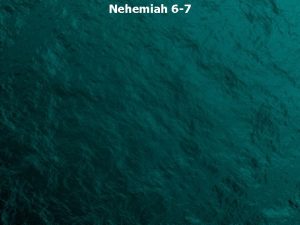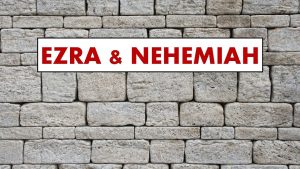Nehemiah Gods Plan Renewal Gods Plan for Renewal


























- Slides: 26

Nehemiah God’s ( יה וה ) Plan Renewal God’s Plan for Renewal Prayer ה Compassion ו Sacrifice ה Leadership י Purity Chapter 10 & 11: A Committed “Covenant” Community

Covenants What is a “covenant”? Have you ever entered into a covenant? Anyone live in a neighborhood, condo complex, or gated community? Did you agree to abide by “Covenants, Conditions, and Restrictions” (CC&Rs) What are the benefits of a “covenant”? Is there a “cost” to breaking a covenant?

God’s Covenants “I will establish my covenant as an everlasting covenant between me and your descendants after you for the generations to come, to be your God and the God of your descendants after you. ” Gen. 17: 7 What is a covenat from God? Can you name any of God’s covenants?

A God Covenant "A covenant is a sovereign pronouncement of God by which He establishes a relationship of responsibility 1. between Himself and an individual, 2. between Himself and mankind in general, 3. between Himself and a nation, or 4. between Himself and a specific human family. The covenants are normally unconditional in the sense that God obligates Himself in grace, by the unrestricted declaration, 'I will' to accomplish certain announced purposes, despite any failure on the part of the person or people with whom He covenants. The human response to the divinely announced purpose is always important, leading as it does to blessing for obedience and discipline for disobedience.

God’s Promises to His People (Edenic & Adamic Covenants) (Abrahamic Covenant) (New Covenant) (Noahic Covenant) (Mosaic Covenant & Palestinian Covenant) (Davidic Covenant)

Let’s Remember His Covenants The Bible speaks of seven different covenants, four of which (Abrahamic, Palestinian, Mosaic, Davidic) God made with the nation of Israel. Of those four, three are unconditional in nature; that is, regardless of Israel's obedience or disobedience, God still will fulfill these covenants with Israel. One of the covenants, the Mosaic Covenant, is conditional in nature. That is, this covenant will bring either blessing or cursing depending on Israel's obedience or disobedience. Three of the covenants (Adamic, Noahic, New) are made between God and mankind in general, and are not limited to the nation of Israel.

The Adamic Covenant can be thought of in two parts: the Edenic Covenant (innocence) and the Adamic Covenant (grace) (Genesis 3: 16 -19). § The Edenic Covenant is found in Genesis 1: 26 -30; 2: 16 -17. The Edenic Covenant outlined man’s responsibility toward creation and God’s directive regarding the tree of the knowledge of good and evil. § The Adamic Covenant included the curses pronounced against mankind for the sin of Adam and Eve, as well as God’s provision for that sin (Genesis 3: 15).

The Noahic Covenant was an unconditional covenant between God and Noah (specifically) and humanity (generally). After the Flood, God promised humanity that He would never again destroy all life on earth with a Flood (see Genesis chapter 9). God gave the rainbow as the sign of the covenant, a promise that the entire earth would never again flood and a reminder that God can and will judge sin (2 Peter 2: 5).

The Abrahamic Covenant (Genesis 12: 1 -3, 6 -7; 13: 14 -17; 15; 17: 1 -14; 22: 15 -18). In this covenant, God promised many things to Abraham. § He personally promised that He would make Abraham’s name great (Genesis 12: 2), § That Abraham would have numerous physical descendants (Genesis 13: 16), and § That he would be the father of a multitude of nations (Genesis 17: 4 -5). § Another provision in the Abrahamic Covenant is that the families of the world will be blessed through the physical line of Abraham (Genesis 12: 3; 22: 18). This is a reference to the Messiah, who would come from the line of Abraham.

The Palestinian Covenant (Deut. 30: 1 -10). The Palestinian Covenant, or Land Covenant, amplifies the land aspect that was detailed in the Abrahamic Covenant. § A delineation of the land to be given by God. (Joshua 1: 4) § According to the terms of this covenant, if the people disobeyed, God would cause them to be scattered around the world (Deuteronomy 30: 3 -4). § But He would eventually restore the nation (verse 5). § When the nation is restored, then they will obey Him perfectly (verse 8), and God will cause them to prosper (verse 9).

The Mosaic Covenant (Deut. 11). The Mosaic Covenant was a conditional covenant that either brought God's direct blessing for obedience or God's direct cursing for disobedience upon the nation of Israel. Part of the Mosaic Covenant was the Ten Commandments (Exodus 20) and the rest of the Law, which contained over 600 commands—roughly 300 positive and 300 negative. The history books of the Old Testament (Joshua–Esther) detail how Israel succeeded at obeying the Law or how Israel failed miserably at obeying the Law. Deuteronomy 11: 26 -28 details the blessings and the curses stemming from obedience or disobedience of the people.

The Davidic Covenant (2 Samuel 7: 8 -16). The Davidic Covenant amplifies the “seed” aspect of the Abrahamic Covenant. The promises to David in this passage are significant. God promised that David's lineage would last forever and that his kingdom would never pass away permanently (verse 16). Obviously, the Davidic throne has not been in place at all times. There will be a time, however, when someone from the line of David will again sit on the throne and rule as king. This future king is Jesus (Luke 1: 32 -33).

The New Covenant (Jeremiah 31: 31 -34). The New Covenant is a covenant made first with the nation of Israel and, ultimately, with all mankind. In the New Covenant, God promises to forgive sin, and there will be a universal knowledge of the Lord. Jesus Christ came to fulfill the Law of Moses (Matthew 5: 17) and create a new covenant between God and His people. Now that we are under the New Covenant, both Jews and Gentiles can be free from the penalty of the Law. We are now given the opportunity to receive salvation as a free gift (Ephesians 2: 8 -9).

Israel’s Covenant With God “Because of all this, we make a firm and sure written covenant, and our princes, Levites, and priests set their seal to it. Now those who placed their seal on the document were: Nehemiah the governor, the son of Hacaliah, and Zedekiah, Seraiah, Azariah, …These were the priests… the Levites …and the leaders. ” Neh 9: 38 – 10: 1 Who takes the “lead” in this covenant? In Nehemiah 9: 38, make a covenant is literally "cut a covenant"; covenants were not made in the ancient world, they were cut - because almost always an animal was sacrificed as part of the covenant. A covenant always cost something, and our point of decision will cost us something the self-life, comfort, ease, some of the passing pleasures of this Nehemiah & the Priests establish a world. Count the cost to see if “Covenant Community” & all sign it's worth it! on to it!

…and the rest of the people… join, bind & obey “The rest of the people —priests, Levites, gatekeepers, musicians, temple servants and all who separated themselves from the neighboring peoples for the sake of the Law of God, together with their wives and all their sons and daughters who are able to understand—all these now join their fellow Israelites the nobles, and bind themselves with a curse and an oath to follow the Law of God given through Moses the servant of God and to obey carefully all the commands, regulations and decrees of the Lord our Lord. What did the “rest of” the people do? Describe the heart of the people? What did this covenant mean in the life of the God’s people residing in the Jerusalem community ?

WE WILL & WE WILL NOT… They made this covenant publicly! Although its most significant meaning was between the individual and God, it was also important that other people be witness to the covenant. A public covenant meant accountability. What follows are a series of oaths, pledges, commitments, promises and agreements that will define their community, bind their community, strengthen their community, and prosper their community as people of God.

WE WILL & WE WILL NOT… “We promise not to give our daughters in marriage to the peoples around us or take their daughters for our sons. ” Neh 10: 30 Their first area of decision: we will be faithful to God when it comes to our romantic & martial relationships (FAMILY) This preserved the important principle that a follower of God should only marry another similarly committed follower of God. It is obvious by experience and observation that it is important to carefully and prayerfully choose your spouse. This priority not only affects the marriage but also is important in the rearing of children.

WE WILL & WE WILL NOT… “When the neighboring peoples bring merchandise or grain to sell on the Sabbath, we will not buy from them on the Sabbath or on any holy day. Every seventh year we will forgo working the land will cancel all debts. ” Neh 10: 31 Second area of decision: we will be faithful to God when it comes to doing business. (WORK) The motive for breaking this law was clear. They could make more money selling on seven days of the week instead of six days. And debts that could not be paid back after 7 years were regarded to be burdensome and oppressive. This was a covenant to only make money in ways that were obedient and glorifying to God. This priority not only affects the our work, but our working relationships with our clients, our coworkers, and our employees. In 2010 Chick-fil-A took the industry lead in average sales per restaurant, making an average of $2. 7 million per restaurant!

WE WILL & WE WILL NOT… The third area of decision: we will be faithful to God when it comes to supporting God's work. (CHURCH, MINISTRIES, & MISSIONS) “We assume the responsibility for carrying out the commands to give a third of a shekel each year for the service of the house of our God: for the bread set out on the table; for the regular grain offerings and burnt offerings; for the offerings on the Sabbaths, at the New Moon feasts and at the appointed festivals; for the holy offerings; for sin offerings to make atonement for Israel; and for all the duties of the house of our God. ” Neh 10: 32 -33 “We—the priests, the Levites and the people—have cast lots to determine when each of our families is to bring to the house of our God at set times each year a contribution of wood to burn on the altar of the Lord our God, as it is written in the Law. ” Neh 10: 34 “We also assume responsibility for bringing to the house of the Lord each year the firstfruits of our crops and of every fruit tree. As it is also written in the Law, we will bring the firstborn of our sons and of our cattle, of our herds and of our flocks to the house of our God, to the priests ministering there. ” Neh 10: 35 -36

WE WILL & WE WILL NOT… “Moreover, we will bring to the storerooms of the house of our God, to the priests, the first of our ground meal, of our grain offerings, of the fruit of all our trees and of our new wine and olive oil. And we will bring a tithe of our crops to the Levites, for it is the Levites who collect the tithes in all the towns where we work. A priest descended from Aaron is to accompany the Levites when they receive the tithes, and the Levites are to bring a tenth of the tithes up to the house of our God, to the storerooms of the treasury. The people of Israel, including the Levites, are to bring their contributions of grain, new wine and olive oil to the storerooms, where the articles for the sanctuary and for the ministering priests, the gatekeepers and the musicians are also kept. ” “We will not neglect the house of our God. ” Neh 10: 37 -39 They simply did two things. First, they agreed to give as God had commanded (the firstborn, firstfruits, and the tithe). Second, they agreed to give as the special need required (the one-third of a shekel tax and the wood).

WE WILL & WE WILL NOT… “Honor the LORD with your possessions, and with the first-fruits of all your increase; so your barns will be filled with plenty, and your vats will overflow with new wine. ” Proverbs 3: 9 -10 § They have covenanted to make money only in ways that would glorify God. § They have covenanted to spend their money in ways that glorify God - and beginning it all with giving unto the Lord and the Lord’s work. § They have covenanted to be good stewards of their money, their crops, their livestock, their work, and their families. THEY COVENANTED TO BE AN OBEDIENT & FAITHFUL PEOPLE TO THEIR GRACIOUS & MERCIFUL GOD

TITHE: Squirm, hum, whistle, look down, fidget… 1. If you hold on to money so tightly that you will not be a giver, than you have revealed where your heart is when it comes to money. 1. The New Testament speaks with great clarity on the principle of giving; that giving should be regular, planned, proportional, and private (1 Corinthians 16: 1 -4); that it must be generous, freely given, and cheerful (2 Corinthians 9). 1. If you are reluctant to be a giver as the Bible says you should, simply talk to those who are. Ask them if it has been a blessing or a curse in their life to give as God says to. God promises He will never owe us anything, and we cannot out-give God though the return is often far better than dollars and cents.

New Testament Giving… What is the “tithe”? What is an “offering”? 1. Tithing is an Old Testament concept. The tithe was a requirement of the law in which all Israelites were to give 10 percent of everything they earned and grew to the Tabernacle/Temple. 1. The New Testament nowhere commands, or even recommends, that Christians submit to a legalistic tithe system. Paul states that believers should set aside a portion of their income in order to support the church and that it should be “in keeping with income. ” 1. The New Testament talks about the importance and benefits of giving. We are to give as we are able. Sometimes that means giving more than 10 percent; sometimes that may mean giving less. 1. Every Christian should diligently pray and seek God’s wisdom in the matter of participating in tithing and/or how much to give (James 1: 5). Above all, all tithes and offerings should be given with pure motives and an attitude of worship to God and service to the body of Christ. 1. Giving has more to do with giving back to God and to further God’s work by giving of our time, talents & treasures! It’s an attitude of the heart!

Questions about Giving? Examine the Heart “Now about the collection for the Lord’s people: Do what I told the Galatian churches to do. On the first day of every week, each one of you should set aside a sum of money in keeping with your income, saving it up, so that when I come no collections will have to be made. Then, when I arrive, I will give letters of introduction to the men you approve and send them with your gift to Jerusalem. If it seems advisable for me to go also, they will accompany me. ” 1 Cor 16: 1 -4 “The point is this: whoever sows sparingly will also reap sparingly, and whoever sows bountifully will also reap bountifully. Each one must give as he has decided in his heart, not reluctantly or under compulsion, for God loves a cheerful giver. ” 2 Cor 9: 6 -7 “Let the elders who perform the duties of their office well be considered doubly worthy of honor [and of adequate financial support], especially those who labor faithfully in preaching and teaching. . ” 1 Tim 5: 18 “For where your treasure is, there will your heart be also. ” Matt 6: 21 “The wicked borrow and do not repay, but the righteous give generously. . . ” Psalm 37: 21

Questions about Giving? Examine the Heart “Give, and it will be given to you. Good measure, pressed down, shaken together, running over, will be put into your lap. For with the measure you use it will be measured back to you. ” Luke 6: 38 “But just as you excel in everything-in faith, in speech, in knowledge, in complete earnestness and in your love for us-see that you also excel in this grace of giving. ” 2 Cor 8: 7 “One gives freely, yet grows all the richer; another withholds what he should give, and only suffers want. ” Prov 11: 24 “In all things I have shown you that by working hard in this way we must help the weak and remember the words of the Lord Jesus, how he himself said, ‘It is more blessed to give than to receive. ’” Acts 20: 35 “And He looked up and saw the rich putting their gifts into the treasury, and He saw also a certain poor widow putting in two mites. So He said, “Truly I say to you that this poor widow has put in more than all; for all these out of their abundance have put in offerings for God but she out of her poverty put in all the livelihood that she had. ” Luke 21: 1 -4

What should be Holy Spirit’s Covenant with God? If we were to “make a firm and sure written covenant” to God, what should it state, declare, profess, and/or testify to? Reverence for God results in Obedience results in Wisdom results in Rewards Psalm 111: 10
 Greek gods vs titans
Greek gods vs titans The gates of nehemiah
The gates of nehemiah Nehemiah leadership qualities
Nehemiah leadership qualities Nehemiah down payment assistance
Nehemiah down payment assistance Nehemiah 2:1-8
Nehemiah 2:1-8 Bible old testament
Bible old testament Nehemiah timeline
Nehemiah timeline Nehemiah 6 1-9
Nehemiah 6 1-9 Nehemiah 2:17-20
Nehemiah 2:17-20 Your wives your daughters
Your wives your daughters Nehemiah 6 1-16
Nehemiah 6 1-16 Nehemiah 8:1-8
Nehemiah 8:1-8 Nehemiah institute peers test
Nehemiah institute peers test Personal integrity in leadership
Personal integrity in leadership Nehemiah 9:38
Nehemiah 9:38 Nehemiah 3
Nehemiah 3 Nehemiah chapter 5
Nehemiah chapter 5 Nehemiah 2:1-10
Nehemiah 2:1-10 Nehemiah 13 outline
Nehemiah 13 outline Nehemiah 3:1-5
Nehemiah 3:1-5 Nehemiah 6 summary
Nehemiah 6 summary Marcello malpighi contribution to fingerprints
Marcello malpighi contribution to fingerprints 3102021
3102021 Nehemiah 8 1-12
Nehemiah 8 1-12 Nehemiah visionary leader
Nehemiah visionary leader Nehemiah 6:1-3
Nehemiah 6:1-3 Lessons from nehemiah 10
Lessons from nehemiah 10
